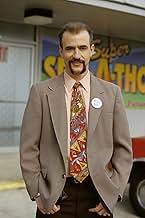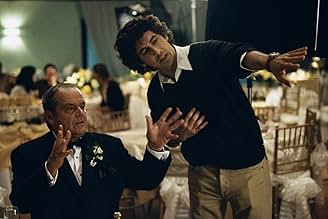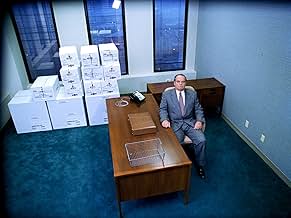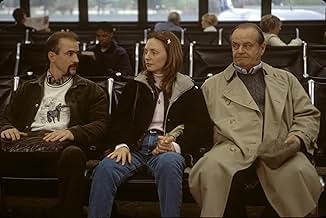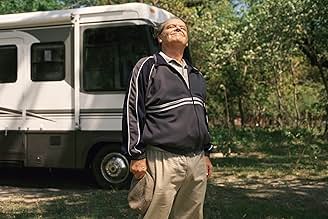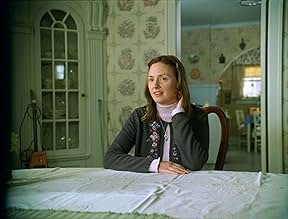Um homem aposentado embarca em uma viagem ao casamento de sua filha, apenas para descobrir mais sobre si e a vida que esperava.Um homem aposentado embarca em uma viagem ao casamento de sua filha, apenas para descobrir mais sobre si e a vida que esperava.Um homem aposentado embarca em uma viagem ao casamento de sua filha, apenas para descobrir mais sobre si e a vida que esperava.
- Direção
- Roteiristas
- Artistas
- Indicado a 2 Oscars
- 25 vitórias e 71 indicações no total
James M. Connor
- Randall's Best Man
- (as James Micheal Connor)
Marilyn Tipp
- Neighbor Lady
- (cenas deletadas)
- Direção
- Roteiristas
- Elenco e equipe completos
- Produção, bilheteria e muito mais no IMDbPro
Avaliações em destaque
It is hard to recommend About Schmidt to anyone, without actually knowing that person. Not only does the story seem unconventionally uneventful to most of modern audiences, but it also moves with an unhurried patience that will let many viewers shift in their seats. It really depends on whether one can develop an interest to the film and its subject matter, which shows a retired man suddenly facing the void and meaninglessness of his existence.
About Schmidt moves slowly, but it moves with grace. The film's success is deeply in debt to Jack Nicholson, subordinating his personality to the character of Warren Schmidt. It must have been difficult for somebody like Nicholson to display the role's required lack of passion without letting Schmidt lose his human touch. Yet, his portrayal is excellent in its understatement, and his numerable supporting actors do not disappoint either. Fans of Nicholson will be assured in their belief, that their favourite is not only one of the best, but also one of the most versatile actors still working today.
Apart from the acting, director Alexander Payne's film is also well crafted. The somewhat saddened mood is only enhanced by documentary-like shots, constantly making us aware that what we witness is really an everyday-tragedy. The script shows intelligence, and although it contains many subtleties, most of them will not go unnoticed with attentive viewers. Even though About Schmidt is billed as a comedy, it really is a drama. Many of the humorous situations are more tragic than funny, and truly hilarious moments are rare occurrences.
I've often wondered whether the title of About Schmidt has been chosen with any clear intent. The German surname Schmidt equals Smith in English and is one of the most common. So about Schmidt could actually mean "About Everybody". Everybody can wake up one day and discover that everything he or she has devoted himself to, amounts to nothing. It's a frequent social phenomenon, that people suddenly wise up that their lives are almost over, without ever having fully lived them. Maybe that's how all the sea cruises and world tours of old pensioners can be accounted for. Like Schmidt, they are all making a desperate effort to catch up on a time that's long done and over with.
The film does not exactly give answers and, like in reality, does not end with any true revelations to escape all bleakness. But there is something it often likes to apply, namely the self explanatory power of irony. Like one time during the film, when Warren Schmidt decides to adopt a six-year old African foster child by mail. A cheque of twenty-two dollars, which he dutifully provides on a monthly basis, assures that little Ndugu can go to school, gets sheltered, fed and clothed. Yet, in one of his letters Warren writes to him: "What difference has my life made to anyone? None that I can think of. None...at all!"
Well, think again, Mr. Schmidt.
About Schmidt moves slowly, but it moves with grace. The film's success is deeply in debt to Jack Nicholson, subordinating his personality to the character of Warren Schmidt. It must have been difficult for somebody like Nicholson to display the role's required lack of passion without letting Schmidt lose his human touch. Yet, his portrayal is excellent in its understatement, and his numerable supporting actors do not disappoint either. Fans of Nicholson will be assured in their belief, that their favourite is not only one of the best, but also one of the most versatile actors still working today.
Apart from the acting, director Alexander Payne's film is also well crafted. The somewhat saddened mood is only enhanced by documentary-like shots, constantly making us aware that what we witness is really an everyday-tragedy. The script shows intelligence, and although it contains many subtleties, most of them will not go unnoticed with attentive viewers. Even though About Schmidt is billed as a comedy, it really is a drama. Many of the humorous situations are more tragic than funny, and truly hilarious moments are rare occurrences.
I've often wondered whether the title of About Schmidt has been chosen with any clear intent. The German surname Schmidt equals Smith in English and is one of the most common. So about Schmidt could actually mean "About Everybody". Everybody can wake up one day and discover that everything he or she has devoted himself to, amounts to nothing. It's a frequent social phenomenon, that people suddenly wise up that their lives are almost over, without ever having fully lived them. Maybe that's how all the sea cruises and world tours of old pensioners can be accounted for. Like Schmidt, they are all making a desperate effort to catch up on a time that's long done and over with.
The film does not exactly give answers and, like in reality, does not end with any true revelations to escape all bleakness. But there is something it often likes to apply, namely the self explanatory power of irony. Like one time during the film, when Warren Schmidt decides to adopt a six-year old African foster child by mail. A cheque of twenty-two dollars, which he dutifully provides on a monthly basis, assures that little Ndugu can go to school, gets sheltered, fed and clothed. Yet, in one of his letters Warren writes to him: "What difference has my life made to anyone? None that I can think of. None...at all!"
Well, think again, Mr. Schmidt.
This is an inspiring story. It teaches me so much about what is important in life. Jack Nicholson, with a great performance as Warren R. Schmidt is an example of an American middle class after retiring. For many years he has worked as an actuary at a big insurance company. After retiring, Jack at home, while watching television, he decides to sponsor a six years old boy (Ndugu) from Tanzania. Sending a check of US$ 22,00 every month, he is also required to write a letter to the boy. In the process of writing these letters, he vents out to the boy about his life frustrations, his lost dreams and the dilemma he is in. He is married for forty-two years with his wife Helen (June Squibb) and he has a daughter living in Denver, Jeannie Schmidt (Hope Davis) who will marry a looser pretty soon. He misses his daughter. A few days after his retirement, his wife dies, and Jack realizes how important the wife was in his life now even though he never appreciated her. The director of the movie, Alexander Payne takes the audiences with Jack on a trip in a trailer to visit specific places in America. He mainly makes Jack visit the places where he has been before physically but at the same time Jack was revisiting his own life inside. In this trip he realizes what really matters in life - friendship, family and sharing- then why it is important to appreciate them whenever you have a chance.
In 'Citizen Kane' (1941), the director Orson Welles portrays the same idea when creating Mr. Kane. The movie is more than the story of a tycoon's rise and fall; it is an account of what is ultimately important in a person's life. Even though Kane attains riches and prestige, he is far from happy. He ends with two failed marriages and few friends. At his dying bed, all he has left is his reminiscences - and something called "Rosebud." In 'About Schmidt' the director Alexander Payne uses voiceover to convey Jack's thoughts and memories throughout the movie. To be specific it is when Jack is writing a letter to the boy he sponsors - (Ndugu), at the same time Payne is informing the audience about Jack's regrets and pain concerning his wife and daughter while the movie is still rolling on. I think this is a great technique.I believe this has been a great adventure and wake up call to many Americans as to what is important in life and why we should cherish every moment of it.
In 'Citizen Kane' (1941), the director Orson Welles portrays the same idea when creating Mr. Kane. The movie is more than the story of a tycoon's rise and fall; it is an account of what is ultimately important in a person's life. Even though Kane attains riches and prestige, he is far from happy. He ends with two failed marriages and few friends. At his dying bed, all he has left is his reminiscences - and something called "Rosebud." In 'About Schmidt' the director Alexander Payne uses voiceover to convey Jack's thoughts and memories throughout the movie. To be specific it is when Jack is writing a letter to the boy he sponsors - (Ndugu), at the same time Payne is informing the audience about Jack's regrets and pain concerning his wife and daughter while the movie is still rolling on. I think this is a great technique.I believe this has been a great adventure and wake up call to many Americans as to what is important in life and why we should cherish every moment of it.
I love Nicolson and I thought his work in this film was as good as any I have seen him do in any of his previous films. My accolades must begin with the writers for creating such a beautiful novel and script-a perfect canvas for the many fine actors in this film upon which they wove their considerable magic. There were no killings, no car chases, no violence of any kind-I'm surprised that Hollywood distributed it.
Such a slice of life-American life with it's many warts-warts that the Americans probably don't even recognize: Winnebagos like moving palaces, freeway monuments to genocide, business that consumes it's workers only to dump them unceremoniously, too much of everything that amounts to emptiness, etc., etc. The novel by Begley, upon which the film was based, illustrated this consumer emptiness brilliantly by the inclusion of the bookends to the film, the sponsorship of the Tanzanian child by Schmidt. The child's material emptiness was contrasted with Schmidt's emotional emptiness in a way America does not recognize much less watch on the screen.
The last part of the movie dealing with the marriage of Schmidt's daughter to a man who came from a diametrically opposite "new age" family was an unstated acknowledgment by his daughter that she wanted nothing of her father's values-she wanted a complete break and she was going to marry the break.
A fascinating, complex movie and I'm sorry I didn't see it much earlier.
Such a slice of life-American life with it's many warts-warts that the Americans probably don't even recognize: Winnebagos like moving palaces, freeway monuments to genocide, business that consumes it's workers only to dump them unceremoniously, too much of everything that amounts to emptiness, etc., etc. The novel by Begley, upon which the film was based, illustrated this consumer emptiness brilliantly by the inclusion of the bookends to the film, the sponsorship of the Tanzanian child by Schmidt. The child's material emptiness was contrasted with Schmidt's emotional emptiness in a way America does not recognize much less watch on the screen.
The last part of the movie dealing with the marriage of Schmidt's daughter to a man who came from a diametrically opposite "new age" family was an unstated acknowledgment by his daughter that she wanted nothing of her father's values-she wanted a complete break and she was going to marry the break.
A fascinating, complex movie and I'm sorry I didn't see it much earlier.
About Schmidt is Forrest Gump through the lens of Sartre or Camus. Warren Schmidt has a handicap, but it's the same handicap most of the people standing on line at seven p.m. at your local Wendy's have. The real star (or anti-star) of About Schmidt is the mediocre architectural landscape of America. Every room or box Warren Schmidt enters in this movie is as devoid of caring and vitality as he is: the retirement banquet room, Warren's house, the tire store, the hired wedding reception room. Schmidt's director and production designer take care to place us in the same life-draining, cheap structures we inhabit and deal with everyday. No prettifying. This is the drab landscape of Fargo revisited, but without the irony. The steady doses of violence in Fargo allowed you an escape route. But there's nothing ironical about a wasted life and a 66 year old widower spinning his wheels in the same rut, now partnerless and foundering. The combination of Jack, this story and these settings is effective and compelling. The result would be, I think, inevitable. The tone and attitude is not consistently managed, even by Nicholsen, whose worn-out, mannered schtick pops up occasionally. Yet the final effect is impossible to fend off: mundane American hell with droll comedic diversion. We experience a downfall as poignant as the smell of bacon cooking in Denny's at eight a.m.
Like Forrest Gump, the film depends on extensive voice over narration, V.O'd by Nicholsen as letters to Schmidt's newly adopted six year old Tanzanian foster child. Through these ridiculous sharings of sextagenarian angst with an African boy, we register Schmidt's internal grievances - thoughts we would never know about otherwise without his commentary. The slow dragging score drains vitality from each transition, as if cinematic momentum would be antithetical to the point of the tale. Back and forth we rock from a single minor chord to a second one, getting nowhere. The mood, the landscape, the buildings, the people say it all: Schmidt's on the road, but he might as well be sitting home in his lay-z-boy. The cushy bucket seat of a 35 foot Winnebago makes a good substitute.
Casting Jack Nicholson may have been the only way this story could have come to the screen. I've racked my brain to think of one other actor who could have pulled Schmidt off. Tony Hopkins? Not with the same comedic finesse. Gene Hackman reprising his role in Coppola's The Conversation or doing his Tennenbaum hamming? Don't think so. Only Jack has the mix. He does some hilarious bits in this, but overall the mood is somber, glum, inert. Can this be how that other famous Warren from Nebransas - Mr. Buffet - lives?
I was confused, amused, depressed and wierdly disoriented by About Schmidt as I left the theater. I commented that it wasn't a film I'd go see again. Thinking about it a day later, I'd hold to that IF it meant returning to the theater and paying. BUT - were I to run across About Schmidt on cable, I doubt I could tear myself away from it any more than I could from a crack up at the Indy 500. And I think that chance encounter might happen more than once, maybe for years. After all, this is the America I know and mark time in myself. A recommended film going experience.
Like Forrest Gump, the film depends on extensive voice over narration, V.O'd by Nicholsen as letters to Schmidt's newly adopted six year old Tanzanian foster child. Through these ridiculous sharings of sextagenarian angst with an African boy, we register Schmidt's internal grievances - thoughts we would never know about otherwise without his commentary. The slow dragging score drains vitality from each transition, as if cinematic momentum would be antithetical to the point of the tale. Back and forth we rock from a single minor chord to a second one, getting nowhere. The mood, the landscape, the buildings, the people say it all: Schmidt's on the road, but he might as well be sitting home in his lay-z-boy. The cushy bucket seat of a 35 foot Winnebago makes a good substitute.
Casting Jack Nicholson may have been the only way this story could have come to the screen. I've racked my brain to think of one other actor who could have pulled Schmidt off. Tony Hopkins? Not with the same comedic finesse. Gene Hackman reprising his role in Coppola's The Conversation or doing his Tennenbaum hamming? Don't think so. Only Jack has the mix. He does some hilarious bits in this, but overall the mood is somber, glum, inert. Can this be how that other famous Warren from Nebransas - Mr. Buffet - lives?
I was confused, amused, depressed and wierdly disoriented by About Schmidt as I left the theater. I commented that it wasn't a film I'd go see again. Thinking about it a day later, I'd hold to that IF it meant returning to the theater and paying. BUT - were I to run across About Schmidt on cable, I doubt I could tear myself away from it any more than I could from a crack up at the Indy 500. And I think that chance encounter might happen more than once, maybe for years. After all, this is the America I know and mark time in myself. A recommended film going experience.
I was dubious when my 65 year old father picked this DVD up from the shelf at Blockbuster. "Great choice dad!", secretly wondering why I let him pick 2 films out of the 3 in the special offer they had going. You see, my father has a penchant for Woody Allen and anybody who has a rather dry sense of humour, this includes Nicholson.
We sat down tonight, and the first thing that hit me was the way that the film was shot. It is shot using rather blue and green hues, so the film is rather subdued. Secondly, the music stands out. Instead of using a typical 'boohoo' orchestra, the film uses beautiful wandering piano and marimba sounds.
The characters, I could easily relate to. Helen, the faithful wife who is excited about getting to spend a new chapter of her life with her husband. The husband, who obeys his wife but secretly resents it. A sudden change which causes a rethink in everything he has done up until that point.
At first, this appeared to be a comedy, but it was soon revealed to be a beautifully poignant film. Throughout, it questions mortality, what you can achieve in life, and how to cope with loss, or change. I don't think I have ever cried as much in 2 hours as I did during this film, and yet at the same time laughed so hard that my sides were splitting.
I would thoroughly recommend anybody to watch this film. It will stay with you for a long time.
We sat down tonight, and the first thing that hit me was the way that the film was shot. It is shot using rather blue and green hues, so the film is rather subdued. Secondly, the music stands out. Instead of using a typical 'boohoo' orchestra, the film uses beautiful wandering piano and marimba sounds.
The characters, I could easily relate to. Helen, the faithful wife who is excited about getting to spend a new chapter of her life with her husband. The husband, who obeys his wife but secretly resents it. A sudden change which causes a rethink in everything he has done up until that point.
At first, this appeared to be a comedy, but it was soon revealed to be a beautifully poignant film. Throughout, it questions mortality, what you can achieve in life, and how to cope with loss, or change. I don't think I have ever cried as much in 2 hours as I did during this film, and yet at the same time laughed so hard that my sides were splitting.
I would thoroughly recommend anybody to watch this film. It will stay with you for a long time.
Você sabia?
- CuriosidadesWhen Jack Nicholson received the Golden Globe for Best Actor in a Drama, he commented afterward, "I'm a little surprised. I thought we had made a comedy."
- Erros de gravaçãoAt the wedding, the priest/minister wears the wrong color of vestments: a purple chasuble and blue stole - purple is for Lent and blue is for Advent. The appropriate color for a wedding in terms of church vestments (be it Catholic, Episcopalian or other) is white.
- Citações
Warren Schmidt: Relatively soon, I will die. Maybe in 20 years, maybe tomorrow, it doesn't matter. Once I am dead and everyone who knew me dies too, it will be as though I never existed. What difference has my life made to anyone. None that I can think of. None at all.
- Cenas durante ou pós-créditosThe film title appears above the New Line Cinema Release credit as end credits are done.
- ConexõesEdited into Nudes in the News: Show #102 (2005)
- Trilhas sonorasYou Sexy Thing
Written by Errol Brown and Tony Wilson
Performed by Hot Chocolate
Courtesy of EMI Records Ltd.
Under license from EMI-Capitol Music Special Markets
Principais escolhas
Faça login para avaliar e ver a lista de recomendações personalizadas
- How long is About Schmidt?Fornecido pela Alexa
Detalhes
- Data de lançamento
- País de origem
- Idioma
- Também conhecido como
- Las confesiones del Sr. Schmidt
- Locações de filme
- Messiah Lutheran Church, 5015 S. 80th Street, Omaha, Nebraska, EUA(Church where the wedding takes place)
- Empresas de produção
- Consulte mais créditos da empresa na IMDbPro
Bilheteria
- Orçamento
- US$ 30.000.000 (estimativa)
- Faturamento bruto nos EUA e Canadá
- US$ 65.016.287
- Fim de semana de estreia nos EUA e Canadá
- US$ 282.367
- 15 de dez. de 2002
- Faturamento bruto mundial
- US$ 105.834.556
- Tempo de duração2 horas 5 minutos
- Cor
- Mixagem de som
- Proporção
- 1.85 : 1
Contribua para esta página
Sugerir uma alteração ou adicionar conteúdo ausente


